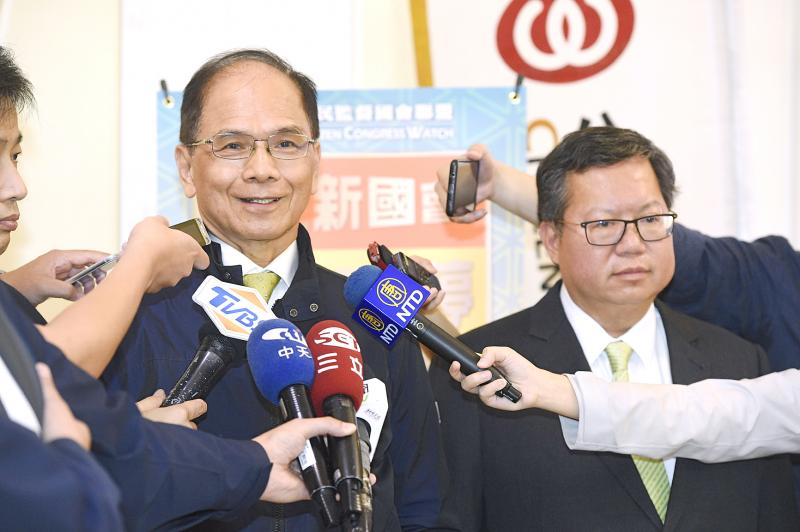The increased frequency of Chinese military activity near or within Taiwan’s airspace over the past month is an attempt by Beijing to force the US into engaging in dialogue with it, Legislative Speaker You Si-kun (游錫堃) said yesterday.
You made the remarks while speaking with reporters ahead of a banquet held by the group Citizen’s Congress Watch.
Although repeated crossings into Taiwan’s airspace have caused public concern, China has made concessions in its territorial claims in the South China Sea, he said.

Photo: George Tsorng, Taipei Times
“Therefore, barring a minor incident that gets out of hand, it seems unlikely that China would incite hostilities during the remainder of the year,” he said.
Over the past several months, China has shown restraint, and weakness, in the South China Sea, he said.
Citing comments by Chinese Minister of Foreign Affairs Wang Yi (王毅) during an interview on Aug. 5, You said Wang referred to the archipelagoes in the South China Sea as the “common homeland” of countries in the region.
Wang had expressed hope for a “rebooting of the South China Sea norms,” and a desire for it to become a “sea of hope, friendship and peace,” You said.
You said the statements appeared to be China shrinking back, and greatly reduced tensions in the South China Sea.
Wang’s statement was a radical departure from comments made by Chinese President Xi Jinping (習近平) on Oct. 18 and Nov. 8, 2015, and July 16, 2016, when he publicly said that the South China Sea was Chinese territory “since ancient times,” You said.
“[The change in stance] is because on July 23 the US called on Chinese and people around the world to come together and change China,” You said. “The US took a strong posture, so Wang conceded.”
However, since the US did not directly engage China in dialogue since taking a tough stance on the South China Sea, Beijing hopes to force it into dialogue by ramping up pressure on Taiwan, he said.
A Chinese anti-submarine aircraft entered Taiwan’s southwest air defense identification zone yesterday, the Ministry of National Defense said, adding that Taiwan’s military responded by scrambling jets to monitor the Chinese aircraft, issuing radio warnings and mobilizing air defense systems.
It was the 17th incursion by Chinese military assets into airspace or waters near Taiwan since Sept. 16, a day before the ministry began regularly revealing Chinese military movements on its Web site, ministry data showed.
“Of course, Taiwan has to be self-reliant and well-prepared, but there is no need to be afraid whenever China talks tough. Every democracy in the world is experiencing China’s ‘wolf warrior diplomacy,’ and everyone is angry,” You said.
Additional reporting by CNA

The US government has signed defense cooperation agreements with Japan and the Philippines to boost the deterrence capabilities of countries in the first island chain, a report by the National Security Bureau (NSB) showed. The main countries on the first island chain include the two nations and Taiwan. The bureau is to present the report at a meeting of the legislature’s Foreign Affairs and National Defense Committee tomorrow. The US military has deployed Typhon missile systems to Japan’s Yamaguchi Prefecture and Zambales province in the Philippines during their joint military exercises. It has also installed NMESIS anti-ship systems in Japan’s Okinawa

TRAGEDY STRIKES TAIPEI: The suspect died after falling off a building after he threw smoke grenades into Taipei Main Station and went on a killing spree in Zhongshan A 27-year-old suspect allegedly threw smoke grenades in Taipei Main Station and then proceeded to Zhongshan MRT Station in a random killing spree that resulted in the death of the suspect and two other civilians, and seven injured, including one in critical condition, as of press time last night. The suspect, identified as a man surnamed Chang Wen (張文), allegedly began the attack at Taipei Main Station, the Taipei Fire Department said, adding that it received a report at 5:24pm that smoke grenades had been thrown in the station. One man in his 50s was rushed to hospital after a cardiac arrest

PUBLIC SAFETY: The premier said that security would be tightened in transport hubs, while President Lai commended the public for their bravery The government is to deploy more police, including rapid response units, in crowded public areas to ensure a swift response to any threats, President William Lai (賴清德) said yesterday after a knife attack killed three people and injured 11 in Taipei the previous day. Lai made the remarks following a briefing by the National Police Agency on the progress of the investigation, saying that the attack underscored the importance of cooperation in public security between the central and local governments. The attack unfolded in the early evening on Friday around Taipei Main Station’s M7 exit and later near the Taipei MRT’s Zhongshan

ON ALERT: Taiwan’s partners would issue warnings if China attempted to use Interpol to target Taiwanese, and the global body has mechanisms to prevent it, an official said China has stationed two to four people specializing in Taiwan affairs at its embassies in several democratic countries to monitor and harass Taiwanese, actions that the host nations would not tolerate, National Security Bureau (NSB) Director-General Tsai Ming-yen (蔡明彥) said yesterday. Tsai made the comments at a meeting of the legislature’s Foreign Affairs and National Defense Committee, which asked him and Minister of National Defense Wellington Koo (顧立雄) to report on potential conflicts in the Taiwan Strait and military preparedness. Democratic Progressive Party (DPP) Legislator Michelle Lin (林楚茵) expressed concern that Beijing has posted personnel from China’s Taiwan Affairs Office to its